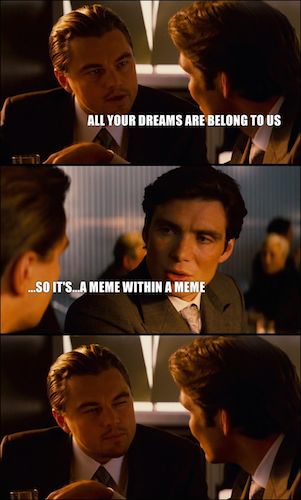Four Words That Don’t Mean What You Think They Do
I’ve already talked about words that people use incorrectly and words that used to have another definition. But what about those word meanings that are just plain wrong? Continuing on the topic of grammar pitfalls, here’s a new post focusing on words that people seem to think mean one thing but that really mean something totally different. To keep things light, I’m starting with four of my favorites, but please feel free to suggest more in the comments! Thanks, and enjoy!
Please note: accounts behind the words listed here are based entirely on personal experience and may not accurately reflect the majority of people’s understanding. The definitions, on the other hand, are correct to the best of my (and the Oxford Dictionaries editors’) knowledge. Read consciously! Thank you!
Inception means “beginning”, not “a dream within a dream”

Memeception?
Shortly after Inception came out in 2010, the Internet was flooded with jokes and memes based on the blockbuster sci-fi film, from captioned dialogues between Leonardo DiCaprio and Cillian Murphy to videos containing the trailer’s infamous “BRAAAM“. One of the most common jokes I’ve heard is to add the suffix -ception to any word to indicate that said thing is contained within another of the same thing (e.g. Jokeception = a joke within a joke). Apparently, the idea of multilayered dreams is such a prominent theme in the film that many believe it to be the major point of the plot. And while it isn’t fair to assume that all or even most people who use this meme don’t know what “inception” really means, there’s always that minority who aren’t even aware there’s a mistake until it’s pointed out to them.
So those of you who count yourselves among this group, take note: “inception” indicates the beginning of something, not a dream with a dream (or any X within an X, for that matter). Feel free to make all the jokes you want, but don’t let the memes confuse you!
Note: in case you were wondering, the actual word for “a thing within a thing” is “recursion”. The title of the movie is Inception because the main characters’ goal is to trigger the birth of an idea within someone’s mind. You’re welcome.
Star-crossed means “ill-fated”, not “soulmates”
When one hears the term “star-crossed”, the first idea to come to mind is most likely William Shakespeare’s Romeo & Juliet. This is to be expected; it is, after all, the play that originated the trope:
From forth the fatal loins of these two foes,
A pair of star cross’d lovers take their life,
Whose misadventur’d piteous overthrows
Doth with their death bury their parents’ strife.
(I.Prologue.5-8)
To anyone even remotely familiar with this story, it should be obvious from the opening sonnet that “star-crossed lovers” are those who struggle against fate. Romeo and Juliet do everything they can to live happily together, yet circumstances and bad luck lead them to a tragic end instead. However, some people seem to misinterpret “star-crossed” as having the opposite meaning, that is, a term for lovers who are destined to be together. It’s an understandable mistake, since hardly anyone can argue against the idea that the eponymous lovers are at least supposed to be together, but that doesn’t make it any less incorrect.
For future reference, “star-crossed” refers to a relationship doomed to be thwarted by external forces. Evidently coined by Shakespeare himself, the term stems from the old belief that the stars controlled fate, and thus the “crossing” of two people’s stars indicated misfortune in their path. Therefore, it should never be used to indicate that two people are soulmates, as it means just the opposite. Be careful!
Wherefore means “why”, not “where”
While we’re on the subject of Romeo & Juliet, here’s a word that everyone has misread at least once. The most famous line in the play comes up during Juliet’s balcony monologue, when Romeo eavesdrops on her musing, “O Romeo, Romeo! Wherefore art thou Romeo?” (II.ii.33)

Juliet’s balcony in Verona, Italy (Source: The Telegraph)
For modern-day readers, it’s natural to read “wherefore” as a fancy “where”, and to assume that Juliet is wondering where her beloved Romeo has gone after the Capulet ball. However, “wherefore” actually comes from a Middle English phrase meaning “what for”, and should thus be read as “why”. This, of course, changes the entire meaning of the above line. Juliet is really saying “Why are you Romeo?”, as in she is lamenting the fact that he is a Montague. It may not mean what you thought it did, but the true definition of “wherefore” makes this line much more poetic, don’t you think?
Decimate means “reduce”, not “obliterate”
While it isn’t a common mistake, I’m almost certain I’ve heard someone use the word “decimate” incorrectly before, probably in a phrase along the lines of “completely decimated”. This is actually something of an oxymoron, as “decimate” refers to the destruction of a percentage of something, not the entire thing. Perhaps this incorrect use was simply a rare example, but just in case, it’s worth clearing up for future reference.
Historically, to “decimate” was to kill one in every ten of a group of people (generally soldiers) as punishment for the entire group. Nowadays, it usually means to destroy a large portion of something, but the historical evidence is still there in the Latin root deci-, which means “tenth”. In any case, it’s generally agreed that the word should not be used to mean “defeat utterly”, so take care with how you use it yourself!
Have you been reading any of these words incorrectly? What other words would you add to this list?


Recent Comments